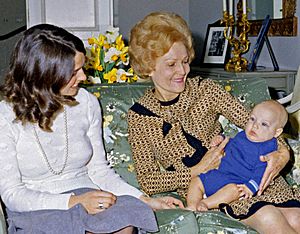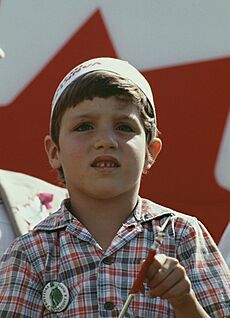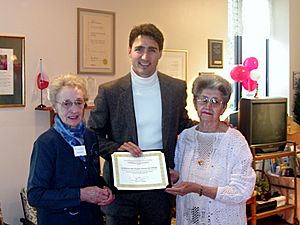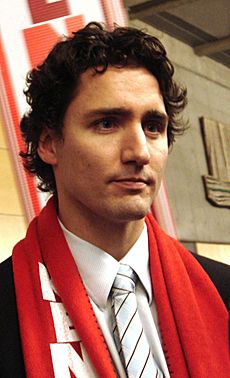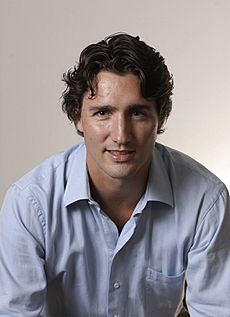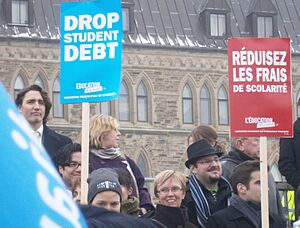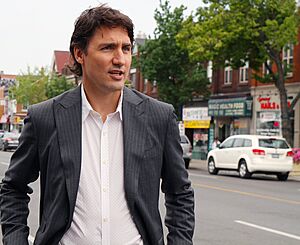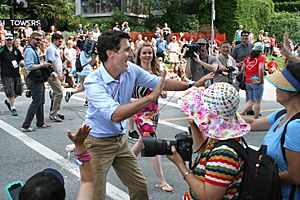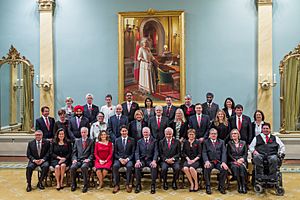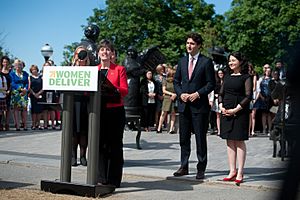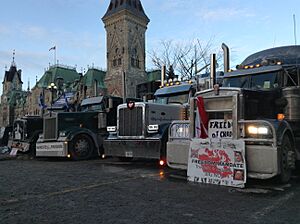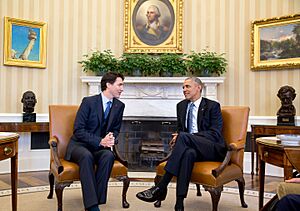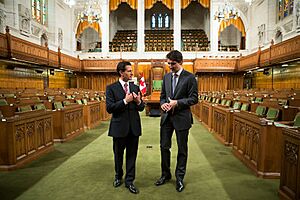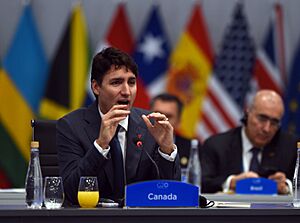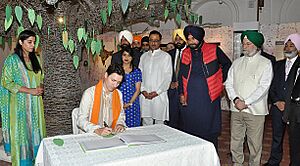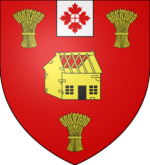Justin Trudeau facts for kids
Quick facts for kids
Justin Trudeau
|
|
|---|---|
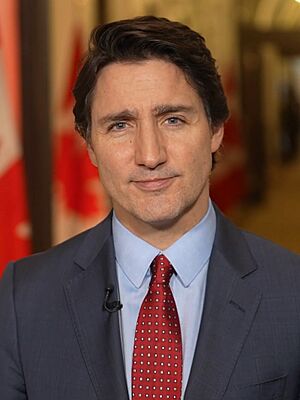
Trudeau in 2023
|
|
| 23rd Prime Minister of Canada | |
| In office November 4, 2015 – March 14, 2025 |
|
| Monarch | |
| Governor General |
|
| Deputy | Chrystia Freeland (2019–2024) |
| Preceded by | Stephen Harper |
| Succeeded by | Mark Carney |
| Leader of the Liberal Party | |
| In office April 14, 2013 – March 9, 2025 |
|
| Deputy | Ralph Goodale (2013–2015) |
| Preceded by | Bob Rae (interim) |
| Succeeded by | Mark Carney |
| Minister of Intergovernmental Affairs and Youth | |
| In office November 4, 2015 – July 18, 2018 |
|
| Prime Minister | Himself |
| Preceded by | Denis Lebel |
| Succeeded by | Dominic LeBlanc |
| Member of Parliament for Papineau |
|
| In office October 14, 2008 – April 28, 2025 |
|
| Preceded by | Vivian Barbot |
| Succeeded by | Marjorie Michel |
| Personal details | |
| Born |
Justin Pierre James Trudeau
December 25, 1971 Ottawa, Ontario, Canada |
| Political party | Liberal |
| Spouse | |
| Children | 3, including Xavier |
| Parents |
|
| Relatives | Trudeau family |
| Alma mater |
|
| Occupation |
|
| Signature | |
Justin Pierre James Trudeau (born December 25, 1971) is a Canadian politician. He served as the 23rd prime minister of Canada from 2015 to 2025. He was also the leader of the Liberal Party from 2013 until his resignation in 2025. Before becoming prime minister, he was a Member of Parliament (MP) for Papineau from 2008 to 2025.
Trudeau was born in Ottawa, Ontario. He is the eldest son of former Prime Minister Pierre Trudeau. He studied at McGill University and the University of British Columbia. After university, he worked as a teacher in Vancouver. He also chaired the youth charity Katimavik. In 2008, he was elected to the House of Commons. In 2013, he became the leader of the Liberal Party. He led the party to a majority government in the 2015 federal election. He was the second-youngest prime minister in Canadian history. He was also the first prime minister whose parent had also been prime minister.
During his time as prime minister, Trudeau's government introduced several important programs. These included the Canada Child Benefit, which helps families with children. His government also worked on trade deals like the Canada-United States-Mexico Agreement (CUSMA). They also signed the Paris Agreement to fight climate change. His government faced challenges, including the COVID-19 pandemic. He also dealt with protests and issues related to foreign interference. Trudeau resigned as prime minister in March 2025.
Contents
- Early Life and Education
- Political Journey
- Prime Minister of Canada (2015–2025)
- After the Premiership (2025–present)
- Personal Life
- Honours and Awards
- Interesting Facts About Justin Trudeau
- Justin Trudeau Quotes
- Images for kids
- See also
Early Life and Education
Family Background
Justin Trudeau was born on December 25, 1971, in Ottawa, Ontario. His father, Pierre Trudeau, was the Prime Minister of Canada at the time. His mother was Margaret Trudeau (née Sinclair). Justin has two younger brothers, Alexandre (born 1973) and Michel (born 1975). Michel sadly passed away in 1998.
Justin was the second child in Canadian history born to a prime minister while they were in office. His grandfathers were businessman Charles-Émile Trudeau and politician James Sinclair. James Sinclair was a minister in Prime Minister Louis St. Laurent's government.
Justin was baptized in Ottawa in January 1972. In April 1972, visiting U.S. President Richard Nixon famously toasted Justin. He said, "I'd like to toast the future prime minister of Canada, to Justin Pierre Trudeau."
Growing Up
Trudeau's parents separated in 1977 when he was five years old. His father was given primary care of the children. His parents later divorced in 1984. Despite the separation, they learned to get along well. Justin has three half-siblings from his parents' later relationships.
Justin lived at 24 Sussex Drive, the prime minister's official residence, until 1979. After his father's government was defeated, they moved to Stornoway. This is the residence for the leader of the Official Opposition. They returned to 24 Sussex Drive in 1980 when his father became prime minister again.
Justin started school in 1976 at Rockcliffe Park Public School. He was in a French immersion program. After his father retired in 1984, the family moved to Montreal. Justin then attended Collège Jean-de-Brébeuf, which was his father's old school. During summers, he went to Camp Ahmek in Algonquin Provincial Park. He later worked there as a camp counsellor.
University and Early Career
Trudeau earned a Bachelor of Arts degree in literature from McGill University. He also has a Bachelor of Education degree from the University of British Columbia. After graduating, he worked as a substitute teacher in Vancouver. He taught French and math at West Point Grey Academy.
In October 2000, Trudeau gained public attention. He delivered a moving eulogy at his father's state funeral. Many people called the Canadian Broadcasting Corporation (CBC) to replay the speech. Some saw it as a sign of a future political career.
In 2007, Trudeau appeared in a CBC Television miniseries called The Great War. He played his distant cousin, Major Talbot Mercer Papineau.
Political Journey
Early Political Steps
Trudeau supported the Liberal Party from a young age. After his father's death, he became more involved in the party. He co-hosted a tribute to former prime minister Jean Chrétien in 2003. He was also asked to lead a group focused on youth renewal for the Liberal Party.
In 2006, Trudeau supported Gerard Kennedy for the Liberal Party leadership. When Kennedy dropped out, Trudeau supported Stéphane Dion, who became the new leader.
In 2007, Trudeau announced he would seek the Liberal nomination in the riding of Papineau. This area had been held by the Liberal Party for many years. On April 29, 2007, he won the nomination.
Member of Parliament (2008–2015)
In the October 14, 2008, federal election, Trudeau won his seat in Papineau. He narrowly defeated the incumbent from the Bloc Québécois. As a new MP, he was seen by many as a potential future prime minister.
The Conservative Party formed a minority government in 2008. Trudeau became a member of the Official Opposition. His first action in Parliament was to propose a national volunteer service policy for young people. In 2009, he became the Liberal Party's critic for multiculturalism and youth. He later became the critic for citizenship and immigration in 2010.
Trudeau was re-elected in Papineau in the 2011 federal election. However, the Liberal Party lost many seats and became the third-largest party. After the election, he was appointed as the party's critic for post-secondary education, youth, and amateur sport.
In 2012, Trudeau participated in a charity boxing match. He fought against Conservative senator Patrick Brazeau. Trudeau won the match in the third round.
Becoming Liberal Party Leader
After the 2011 election, many people wondered if Trudeau would run for the Liberal Party leadership. He initially said he would not, due to his young family. However, after interim leader Bob Rae announced he would not run, Trudeau reconsidered. Polls showed that if Trudeau became leader, the Liberal Party's support would increase significantly.
On October 2, 2012, Trudeau officially launched his campaign for the Liberal Party leadership. His campaign team included longtime friends and experienced political advisors. During the campaign, he faced questions about his policy positions.
On March 13, 2013, his main challenger, Marc Garneau, dropped out of the race. Garneau said his polling showed he could not defeat Trudeau. On April 14, 2013, Justin Trudeau was declared the winner of the leadership election. He received 80.1% of the votes.
Leading the Liberal Party (2013–2015)
After becoming leader, support for the Liberal Party grew. Trudeau promised to put his personal assets into a blind trust. This is a common practice for leaders to avoid conflicts of interest. He fulfilled this promise in July 2013.
In 2014, Trudeau released a video outlining his economic plans. He spoke about the importance of an economy that benefits everyone.
2015 Federal Election Victory
On October 19, 2015, Trudeau led the Liberals to a major victory in the federal election. The Liberals won 184 out of 338 seats. This gave them a strong majority government. It was a gain of 150 seats compared to the 2011 election. This was one of the best performances in the party's history.
The Liberals won all seats in Atlantic Canada and Toronto. They also won 40 seats in Quebec. This was the first time since 1980 that the Liberals won a majority of seats in Quebec. The 150-seat gain was the largest increase for a single party since Canada was formed. It was also the first time a party went from third place to a majority government.
Trudeau gave a victory speech that night. He spoke about former Liberal prime minister Wilfrid Laurier's "sunny ways" approach. This approach focused on bringing Canadians together.
Prime Minister of Canada (2015–2025)
Taking Office
Justin Trudeau and his Cabinet were sworn in by Governor General David Johnston on November 4, 2015. Trudeau stated that his first goal was to lower taxes for middle-income Canadians. He also promised to improve relations with Indigenous peoples in Canada. His government also brought back the mandatory long-form census.
Key Policies and Initiatives
The Trudeau government focused on several key areas. In terms of the economy, they aimed to increase government spending. They also worked to reduce Canada's debt-to-GDP ratio until 2020. His government supported policies that promoted equality and women's rights.
One major program was the Canada Child Benefit. This program aimed to help families and reduce child poverty. His government also introduced a national child care plan. The goal was to reduce day care fees to $10 a day per child within five years.
On the environment, Trudeau's government set goals to reduce greenhouse gas emissions. They aimed for a 30% reduction by 2030 and net-zero emissions by 2050. A key tool for this was a federal carbon pricing policy. They also passed laws for marine conservation and to ban some single-use plastic products.
As prime minister, Trudeau launched important investigations. These included the National Inquiry into Missing and Murdered Indigenous Women. This inquiry looked into the issue of missing and murdered Indigenous women and girls.
COVID-19 Pandemic Response
Trudeau was prime minister during the global COVID-19 pandemic. His government took many steps to respond. They provided funds to provinces and territories. They also supported coronavirus research and set up travel restrictions.
To help with the economic impact, Trudeau's government introduced several programs. These included the Canada Emergency Response Benefit (CERB). This program provided financial support to Canadians who lost their jobs. They also created the Canada Emergency Wage Subsidy to help businesses keep employees.
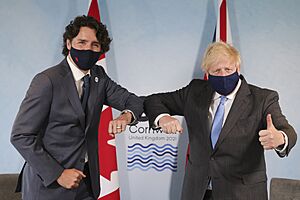
The federal government was also in charge of getting COVID-19 vaccines. They made deals with companies like Pfizer and Moderna. Starting in December 2020, Trudeau oversaw Canada's large-scale vaccination program.
Freedom Convoy and Emergencies Act
In January 2022, a large protest called the Freedom Convoy took place. Truckers and others protested against COVID-19 vaccine requirements. The protests gathered in Ottawa and blocked roads.
On February 14, 2022, Trudeau used the Emergencies Act. This was the first time the Act had been used since 1988. It allowed the government to take special measures to end the protests. The emergency declaration was removed on February 23, 2022. A later inquiry found that the government met the legal requirements to use the Act. However, a Federal Court judge later ruled that the use of the Act was "not justified" and affected people's rights. The government plans to appeal this ruling.
Federal Elections (2019 & 2021)
2019 Federal Election
On September 11, 2019, Trudeau called a federal election. During the campaign, some old photos and videos of Trudeau wearing makeup that darkened his skin were published. Trudeau apologized publicly, saying he recognized it was racist.
While the Liberal Party lost 20 seats, they still won the most seats. This allowed Trudeau to form a minority government. The Conservative Party won a slightly higher share of the national popular vote.
2021 Federal Election
On August 15, 2021, Trudeau called another election. The Liberals aimed to win a majority government. In the 2021 federal election, Trudeau secured a third term as prime minister. However, his party won another minority government with 160 seats. They also came in second in the national popular vote.
Working with the NDP
On March 22, 2022, the Liberals and the New Democratic Party (NDP) made an agreement. The NDP agreed to support the Liberals on important votes. In return, the Liberal Party would work on NDP priorities. These included a national dental care plan for low-income Canadians.
In September 2024, the NDP ended this agreement. The Conservative Party tried to pass "no-confidence motions" to challenge the government. However, these motions did not receive NDP support at the time.
International Relations
In 2015, Trudeau suggested Canada could be a "first postnational state." This meant a country that goes beyond traditional national identities.
Trudeau had good relations with U.S. President Barack Obama. His government also worked to welcome 25,000 Syrian war refugees. In 2016, Canada removed visa requirements for Mexican citizens.
When Donald Trump became U.S. president in 2017, relations between Canada and the U.S. changed. The Trump administration pushed to renegotiate NAFTA. This led to the CUSMA trade agreement. Donald Trump also put tariffs on Canadian steel and aluminum. Trudeau's government responded with its own tariffs on U.S. goods.
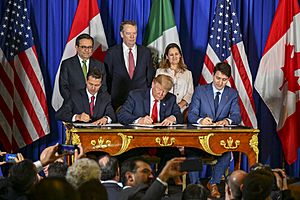
Canada's relationship with China also became difficult. In December 2018, Meng Wanzhou was arrested in Vancouver at the request of the U.S. Soon after, two Canadians, Michael Spavor and Michael Kovrig, were arrested in China. They were released in September 2021. Many believed they were exchanged as part of a deal.
In September 2023, Trudeau stated that Canada had "credible intelligence" that the government of India was involved in the killing of a Canadian citizen, Hardeep Singh Nijjar. This led to a diplomatic disagreement between Canada and India.
In October 2023, Trudeau condemned the Hamas-led attack on Israel. He expressed support for Israel's right to self-defence. Later, he called for a "sustainable ceasefire" in the conflict.
Ethics and Challenges
Trudeau faced criticism regarding fundraising events. Opponents called them "cash for access" schemes. People paid high fees to attend events with Trudeau and other ministers. Trudeau defended his actions, saying they followed ethics rules. He later introduced new rules for political fundraisers.
In January 2017, the ethics commissioner began an investigation into Trudeau. This was about a vacation he and his family took to a private island. The report found that Trudeau had broken four rules of the Conflict of Interest Act. He was the first prime minister to break this law.
In February 2018, Trudeau's government invited Jaspal Atwal to a dinner in India. Atwal had a criminal record. The invitation was later cancelled, and the government apologized.
SNC-Lavalin Affair
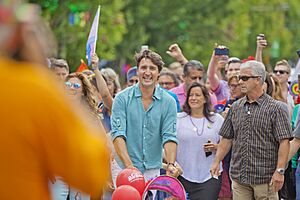
In February 2019, reports suggested that the Prime Minister's Office tried to influence the Attorney General, Jody Wilson-Raybould. This was about a criminal case against the company SNC-Lavalin. The company faced charges of paying bribes in Libya. Trudeau denied directing Wilson-Raybould.
The ethics commissioner investigated these allegations. The final report, released in August 2019, concluded that Trudeau had violated a section of the Conflict of Interest Act.
WE Charity Investigation
In July 2020, the ethics commissioner began another investigation involving Trudeau. This was about the government's decision to have WE Charity run a student grant program. There were concerns because Trudeau's family had ties to the charity. His mother, brother, and wife had been paid to speak at WE Charity events.
Trudeau stated that WE Charity was chosen because it had the ability to run the program. The charity and the government later decided to end their agreement. The ethics commissioner cleared Trudeau of wrongdoing in this case.
Resignation as Prime Minister
After the 2021 election, the Liberal Party's popularity declined. They also lost some important by-elections. This led to discussions and concerns within the party about Trudeau's leadership.
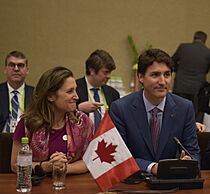
In late 2024, several ministers in Trudeau's cabinet resigned. On December 16, 2024, Chrystia Freeland resigned as Deputy Prime Minister and Minister of Finance. Her resignation came amid new tariff threats from the U.S. and disagreements over economic policy. This event led to further questions about Trudeau's leadership.
On January 6, 2025, Justin Trudeau announced his resignation. He stated he would step down as leader of the Liberal Party and as prime minister. He said Canada deserved a "real choice" in the next election. He also mentioned facing "internal battles" that were a distraction. He asked the Governor General to pause Parliament until March 24. This allowed the party to hold a leadership election.
On January 15, Trudeau confirmed he would not seek re-election as an MP. On March 9, Mark Carney was elected as the new leader of the Liberal Party. Justin Trudeau formally resigned as prime minister on March 14, 2025. Mark Carney was sworn in as the 24th prime minister of Canada later that day.
After the Premiership (2025–present)
In April 2025, Trudeau made his first public appearance after resigning. He campaigned for a Liberal candidate in his former riding of Papineau. He also attended the 2025 Speech from the Throne in May.
Personal Life
Family Life
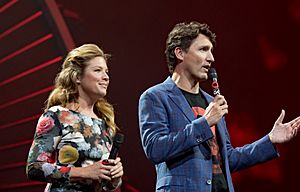
Trudeau first met Sophie Grégoire when they were children in Montreal. She was a friend of his youngest brother, Michel. They reconnected in 2003 and began dating. They got engaged in October 2004 and married on May 28, 2005. They have three children: a son named Xavier, a daughter named Ella-Grace, and another son named Hadrien.
In June 2013, the couple sold their home in Montreal. They then lived in a rented house in Ottawa. After his election victory in 2015, Trudeau chose to live at Rideau Cottage. This is located on the grounds of Rideau Hall.
On August 2, 2023, Trudeau announced that he and Grégoire had separated.
Faith
Trudeau's father was a devout Catholic. His mother also converted to Catholicism. Trudeau himself became less involved with the Catholic Church at age 18. However, after his brother Michel's death in 1998, he reconnected with his faith. In 2011, Trudeau stated that his personal faith is a very important part of who he is.
Honours and Awards
As a former prime minister, Justin Trudeau is known as "The Right Honourable" for life.
| Ribbon | Description | Notes |
| Queen Elizabeth II Diamond Jubilee Medal for Canada |
|
|
| Grand Cross of the Order of La Pléiade |
|
|
| Order of Liberty (Ukraine) |
|
|
| King Charles III Coronation Medal (Canadian Version) |
|
After his father's death in 2000, Justin Trudeau inherited his father’s coat of arms. These arms were granted in 1994.
- Honorary Degrees
| Location | Date | School | Degree | Gave commencement address |
|---|---|---|---|---|
| July 5, 2017 | University of Edinburgh | Doctorate | Yes | |
| May 16, 2018 | New York University | Doctor of Laws (LL.D.) | Yes |
- Other Awards
| Year | Awarded | Awarder | Reference |
| 2018 | Polio Eradication Champion Award | Rotary International | |
| 2020 | Honorary Fellowship | Royal Canadian Geographical Society |
Interesting Facts About Justin Trudeau
- He has Scottish and French Canadian family roots.
- As a child, Trudeau enjoyed camping with his father.
- He is a lapsed Catholic, meaning he was raised Catholic but no longer practices regularly.
- Trudeau is one of several children of former prime ministers who have become Canadian media personalities.
- In 2007, he acted in a two-part TV show called The Great War. This show was about Canada's role in the First World War.
Justin Trudeau Quotes
- "People think that boxing is all about how hard you can hit your opponent. It's not. Boxing is about how hard a hit you can take and keep going."
- "Excluding citizens' voices from politics leads down a very bad path."
- "My idea of freedom is that we should protect the rights of people to believe what their conscience dictates, but fight equally hard to protect people from having the beliefs of others imposed upon them."
- "The way to build a strong future is by both protecting the environment and creating good jobs."
Images for kids
See also
 In Spanish: Justin Trudeau para niños
In Spanish: Justin Trudeau para niños
 | Audre Lorde |
 | John Berry Meachum |
 | Ferdinand Lee Barnett |


